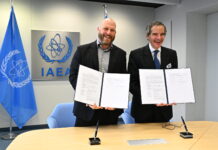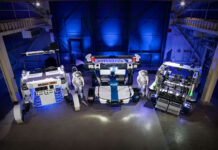Title: Lenovo Unveils Revolutionary Energy-Efficient Supercomputing Solutions for AI Transformation
In an exciting development in the world of technology, Lenovo, a leader in supercomputer manufacturing, has introduced a series of innovative high-performance computing (HPC) platforms that promise to redefine energy efficiency and accelerate computing capabilities. These advancements were unveiled at the Supercomputing 2024 (SC24) event in Atlanta, highlighting Lenovo’s commitment to supporting scientific and industrial research by harnessing the power of artificial intelligence (AI) at unprecedented scales.
The Role of Data Centers in AI and the Digital Economy
In today’s digital economy, data centers have become the backbone of AI development and deployment. As AI continues to permeate various sectors, from finance and healthcare to manufacturing and beyond, the demand for energy-efficient solutions is at an all-time high. SC24, renowned for being the largest gathering of HPC and research leaders, has expanded its reach to include executives from diverse industries who are keen on integrating AI into their operations.
High-performance computing is a crucial component for enterprises aiming to leverage AI’s full potential. With the introduction of these new platforms, Lenovo is poised to play a pivotal role in this transformation.
Cooling AI Factories with Advanced Supercomputing Technologies
AI and HPC are unlocking new data-driven insights and advanced applications across industries. However, as organizations strive to enhance their AI workloads, they encounter new thermal management challenges. Lenovo has addressed these issues with its cutting-edge cooling solutions, paving the way for the future of AI factories.
Over the past decade, Lenovo has garnered extensive expertise, supported by more than 40 patents, in scalable supercomputing. One of the standout technologies from Lenovo is the 6th Generation Neptune® Liquid Cooling system. This innovative solution utilizes liquid cooling instead of traditional air cooling, offering significant energy efficiency improvements. By flipping servers to a vertical orientation and using a fully liquid-cooled system, Lenovo eliminates the need for energy-consuming fans, making the setup ideal for standard industry racks.
Scott Tease, Vice President of Lenovo Infrastructure Solutions Group, Products, emphasized the system’s versatility: "Every data center provider can integrate these systems without major modifications. No need for reinforced floors or specialized power requirements. Lenovo’s Neptune liquid cooling enables users to access top-tier computing performance now and in the future."
Lenovo’s 6th Generation Neptune Cooling and AI Innovations
The 6th generation Lenovo Neptune water-cooled supercomputing servers combine the latest processor and accelerator technologies to deliver scalable efficiency, unlocking AI’s full potential. At SC24, Lenovo announced support for NVIDIA’s GB200 Grace Blackwell NVL4 Superchip, featured in the Lenovo ThinkSystem SC777 V4 Neptune.
This platform is designed to run trillion-parameter AI models efficiently, accelerating product development while reducing costs. At its core, the NVIDIA GB200 Grace Blackwell NVL4 Superchip integrates four NVIDIA Blackwell GPUs and two NVIDIA Grace CPUs, enabling massive scaling options with NVIDIA Quantum InfiniBand or Spectrum-X Ethernet platforms.
Lenovo has also introduced new Enterprise Reference Architectures with NVIDIA, assisting joint customers in building high-performance, scalable, and secure AI factories.
Water-Cooled Supercomputers: A Step Towards Sustainable Energy
Lenovo’s water-cooled supercomputers are making waves in various industries, from automobile and aerospace design to financial risk assessment and genome mapping. These systems are key to the global shift towards energy-efficient supercomputing.
In Italy, the National Agency for New Technologies, Energy and Sustainable Economic Development (ENEA) selected Lenovo to install an HPC system at the Portici hub. This installation aims to accelerate research on clean energy, particularly nuclear fusion. The system, consisting of 758 nodes with Intel® Xeon® CPUs, will increase the computational power from 1.01 to over 6.5 Petaflops, placing it at the forefront of national processing capabilities.
Sustainability was a critical factor for ENEA, and Lenovo’s solution offers superior energy efficiency. The Neptune direct water-cooling technology captures up to 98% of the generated heat, reducing the need for fans and maintaining optimal CPU temperatures.
Similarly, Cineca, a prominent computing center in Italy, has partnered with Lenovo to install an HPC system for researching fusion energy. This infrastructure will perform approximately 45 million billion operations per second and contribute to the Bologna Technopole ecosystem.
Expanding AI Capabilities with Colocation Partnerships
For organizations seeking maximum AI and HPC performance without in-house liquid-cooling infrastructure, Lenovo collaborates with leading colocation companies to offer Neptune-ready infrastructure for private AI workloads. These partnerships enable customers to implement high-performance private AI solutions even without a dedicated data center.
Digital Realty, a key partner, has integrated Lenovo Neptune cooling technology into its high-density colocation offerings across its global data centers. This partnership addresses the challenges posed by AI’s high-density workloads in various industries. Digital Realty’s Private AI Exchange enhances these capabilities, providing a secure and scalable environment for AI workloads.
One notable collaboration between Digital Realty and Lenovo enabled a global financial services provider to scale and distribute HPC capabilities for financial risk management. By leveraging Digital Realty’s PlatformDIGITAL®, the provider expanded data center capacity without incurring capital expenditure for building its own facility, achieving a sixfold increase in deployment speed.
Deploying Lenovo Neptune direct liquid-cooling infrastructure with high-density colocation has resulted in a 30% improvement in energy efficiency, aligning with the company’s goal of engineering the most energy-efficient solutions.
Conclusion
Lenovo’s latest innovations in supercomputing not only enhance energy efficiency but also accelerate AI-powered transformation across industries. By harnessing the power of advanced cooling technologies and strategic partnerships, Lenovo is paving the way for a more sustainable and efficient future in AI and HPC. For more insights into Lenovo’s transformative solutions and their impact on AI-driven advancements, visit their official website.
For more Information, Refer to this article.


































